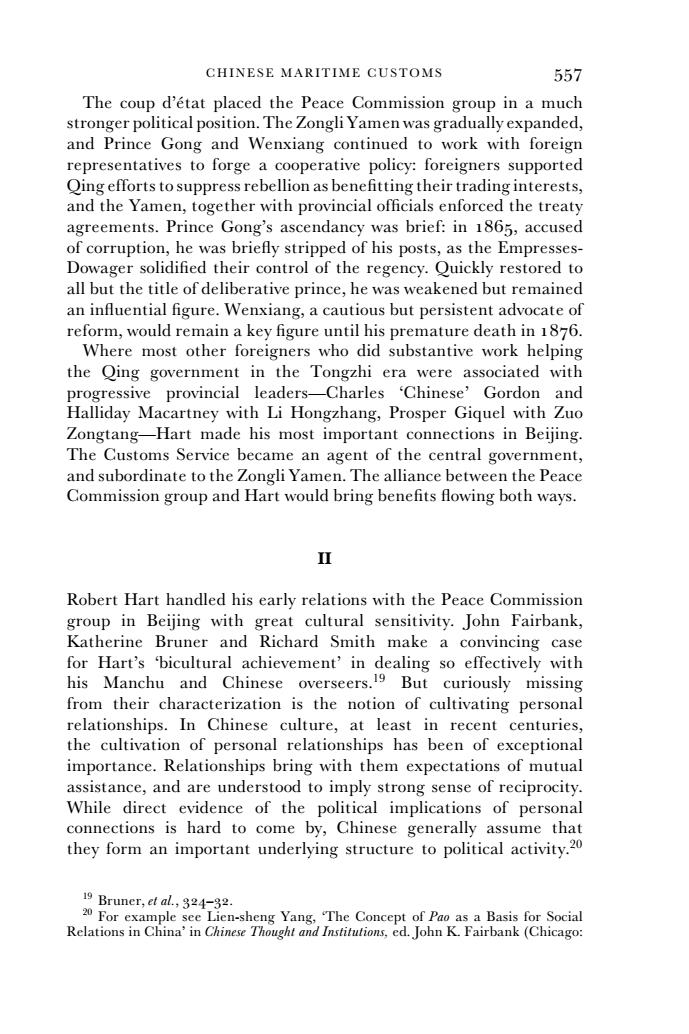正在加载图片...

CHINESE MARITIME CUSTOMS 557 The coup d'etat placed the Peace Commission group in a much stronger political position.The Zongli Yamen was gradually expanded, and Prince Gong and Wenxiang continued to work with foreign representatives to forge a cooperative policy:foreigners supported Qing efforts to suppress rebellion as benefitting their trading interests, and the Yamen,together with provincial officials enforced the treaty agreements.Prince Gong's ascendancy was brief:in 1865,accused of corruption,he was briefly stripped of his posts,as the Empresses- Dowager solidified their control of the regency.Quickly restored to all but the title of deliberative prince,he was weakened but remained an influential figure.Wenxiang,a cautious but persistent advocate of reform,would remain a key figure until his premature death in 1876. Where most other foreigners who did substantive work helping the Qing government in the Tongzhi era were associated with progressive provincial leaders-Charles Chinese'Gordon and Halliday Macartney with Li Hongzhang,Prosper Giquel with Zuo Zongtang-Hart made his most important connections in Beijing. The Customs Service became an agent of the central government, and subordinate to the Zongli Yamen.The alliance between the Peace Commission group and Hart would bring benefits flowing both ways. I Robert Hart handled his early relations with the Peace Commission group in Beijing with great cultural sensitivity.John Fairbank, Katherine Bruner and Richard Smith make a convincing case for Hart's bicultural achievement'in dealing so effectively with his Manchu and Chinese overseers.19 But curiously missing from their characterization is the notion of cultivating personal relationships.In Chinese culture,at least in recent centuries, the cultivation of personal relationships has been of exceptional importance.Relationships bring with them expectations of mutual assistance,and are understood to imply strong sense of reciprocity. While direct evidence of the political implications of personal connections is hard to come by,Chinese generally assume that they form an important underlying structure to political activity.20 19 Bruner,et al,324-32. 20 For example see Lien-sheng Yang,The Concept of Pao as a Basis for Social Relations in China'in Chinese Thought and Institutions,ed.John K.Fairbank(Chicago:CHINESE MARITIME CUSTOMS 557 The coup d’´etat placed the Peace Commission group in a much stronger political position. The Zongli Yamen was gradually expanded, and Prince Gong and Wenxiang continued to work with foreign representatives to forge a cooperative policy: foreigners supported Qing efforts to suppress rebellion as benefitting their trading interests, and the Yamen, together with provincial officials enforced the treaty agreements. Prince Gong’s ascendancy was brief: in 1865, accused of corruption, he was briefly stripped of his posts, as the EmpressesDowager solidified their control of the regency. Quickly restored to all but the title of deliberative prince, he was weakened but remained an influential figure. Wenxiang, a cautious but persistent advocate of reform, would remain a key figure until his premature death in 1876. Where most other foreigners who did substantive work helping the Qing government in the Tongzhi era were associated with progressive provincial leaders—Charles ‘Chinese’ Gordon and Halliday Macartney with Li Hongzhang, Prosper Giquel with Zuo Zongtang—Hart made his most important connections in Beijing. The Customs Service became an agent of the central government, and subordinate to the Zongli Yamen. The alliance between the Peace Commission group and Hart would bring benefits flowing both ways. II Robert Hart handled his early relations with the Peace Commission group in Beijing with great cultural sensitivity. John Fairbank, Katherine Bruner and Richard Smith make a convincing case for Hart’s ‘bicultural achievement’ in dealing so effectively with his Manchu and Chinese overseers.19 But curiously missing from their characterization is the notion of cultivating personal relationships. In Chinese culture, at least in recent centuries, the cultivation of personal relationships has been of exceptional importance. Relationships bring with them expectations of mutual assistance, and are understood to imply strong sense of reciprocity. While direct evidence of the political implications of personal connections is hard to come by, Chinese generally assume that they form an important underlying structure to political activity.20 19 Bruner, et al., 324–32. 20 For example see Lien-sheng Yang, ‘The Concept of Pao as a Basis for Social Relations in China’ in Chinese Thought and Institutions, ed. John K. Fairbank (Chicago: